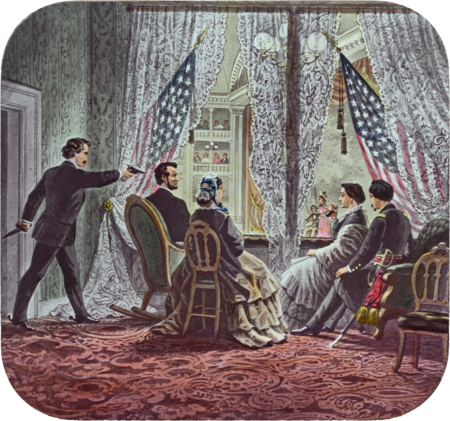When Abraham Lincoln declared the southern slaves free with his Emancipation Proclamation, he did it as a war measure. The Constitution does not give the Federal government the authority to regulate or prohibit slavery, but Lincoln's argument was that he could do it, because it had to be done to win the war. This was shaky legal ground, and it was also unclear what would happen when the war ended. Since emancipation was done as a war measure, if there was no war, would they go back to being slaves?
The United States Congress determined to address this issue, and various bills were debated to determine what should be done. Several different Constitution Amendments were suggested to prohibit slavery. Eventually in early 1864 the Senate Judiciary Committee worked to merge multiple versions into one amendment. The committee introduced it to the Senate on February 10th, and it was passed with a vote of 38 to 6 on April 8, 1864. Next the amendment would have to pass the House, and there it encountered some trouble. In June the amendment failed to pass, with not enough Democrats supporting the measure to reach the two-thirds majority required by the Constitution.
 |
| Garrett Davis |
Since the southern states were not participating, no one was really arguing in favor of slavery. The Democrats were simply arguing that it would violate the principles of state's rights to give the Federal government control over slavery, which was part of the internal government of the states. Senator Garrett Davis of Kentucky argued that the proposed amendment:
strikes at one of the most essential principles of our commingled system of national and of State governments. ... The absorption of the sovereignty ... to the general Government ... would be revolutionary and destructive of our system....1
 |
| John Hale |
The Republicans argued that slavery was evil, and that it stood against the principles under which the United States had been founded. They believed that the time had come to rid the nation of an evil and unchristian blot on its record. John Hale of New Hampshire said,
We have had upon the pages of our public history, our public documents, and our public records some of the sublimest truths that every fell from human lips; and there never has been in the history of the world a more striking contrast than we have presented to heaven and earth between the grandeur and sublimity of our professions and the degradation and infamy of our practice.2
After many debates, the House did not have the votes to pass the amendment. Abraham Lincoln supported it, but not publicly, as he did not want to hurt his chances in the November 1864 election. After he was safely reelected, he turned his attention to getting the amendment passed as quickly as possible. Republican politicians like Secretary of State William Seward were willing to use any means necessary to win over votes. Government jobs or even direct bribes were offered to Democrats to try to convince them to change their position. Lincoln himself worked to convince representatives to support the amendment.
 |
| The 13th Amendment, with Lincoln's signature |
The final vote was held on January 31st, 150 years ago today. Neither side was sure how the vote would go. When the tally was made, the amendment passed 119-56, just over the two-thirds requirement. Sixteen Democrats joined all of the Republicans to pass it. The House and galleries broke out into celebrations when the amendment was passed. Although he had no formal role in the process, Abraham Lincoln added his signature to the joint resolution of Congress.
 |
| Congress passes the amendment |
This was only the first step of the amendment process. The 13th Amendment still had to be ratified by three quarters of the states. Back in 1861 Congress had passed the Corwin Amendment, which would have guaranteed the protection of slavery to try to prevent the southern states from leaving the Union, but it was not ratified by enough states. The 13th Amendment was quickly ratified by every state remaining in the Union except for Delaware and Kentucky. Under the northern view the southern states were still in the Union, just in a state of rebellion, so they were necessary to reach the three quarters required. Reconstruction governments in Virginia and Louisiana ratified it. In the process of reconstruction the other southern states were told that to be readmitted to the Union they had to pass the amendment. Enough did so by the end of 1865 that Seward certified the amendment on December 18.
 |
Blue: Ratified amendment
Green: Ratified amendment after it was enacted
Pink: Rejected amendment, later ratified after enactment |
The 13th Amendment was a major step in the process of Reconstruction. By it the Federal government legitimized and permanently established the Emancipation Proclamation, ensuring that slavery would be outlawed in the southern states. By the way it was ratified, a precedent was set. The rebellious states would not be immediately readmitted to the Union. Conditions would be put upon the reconciliation, to ensure that the reestablished Union was upon those terms which the North believed necessary.
1. Great Debates in American
History, (New York: Current
Literature Publishing Company, 1915) vol.
6, p.
2. Ibid, p.
400.









